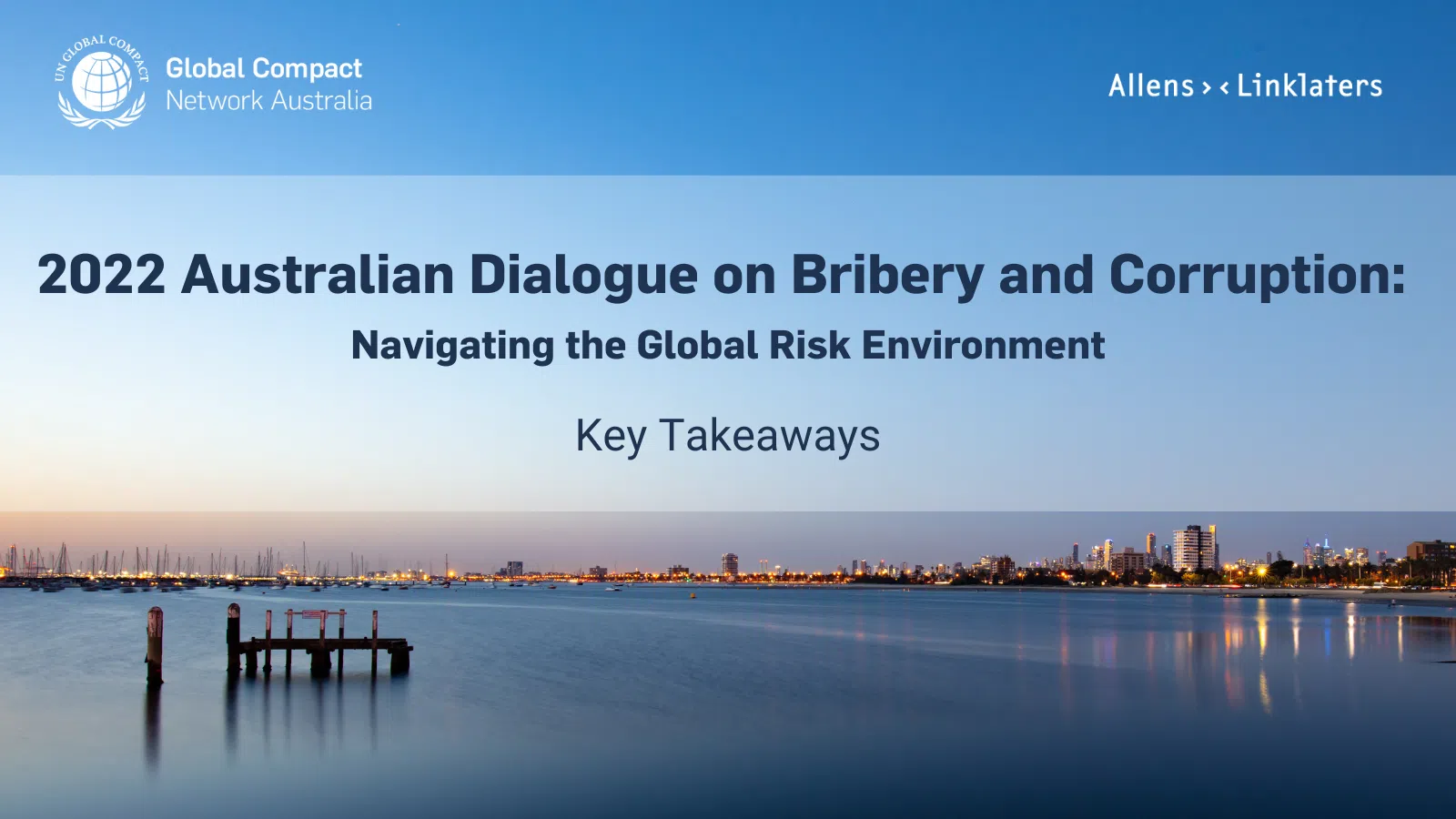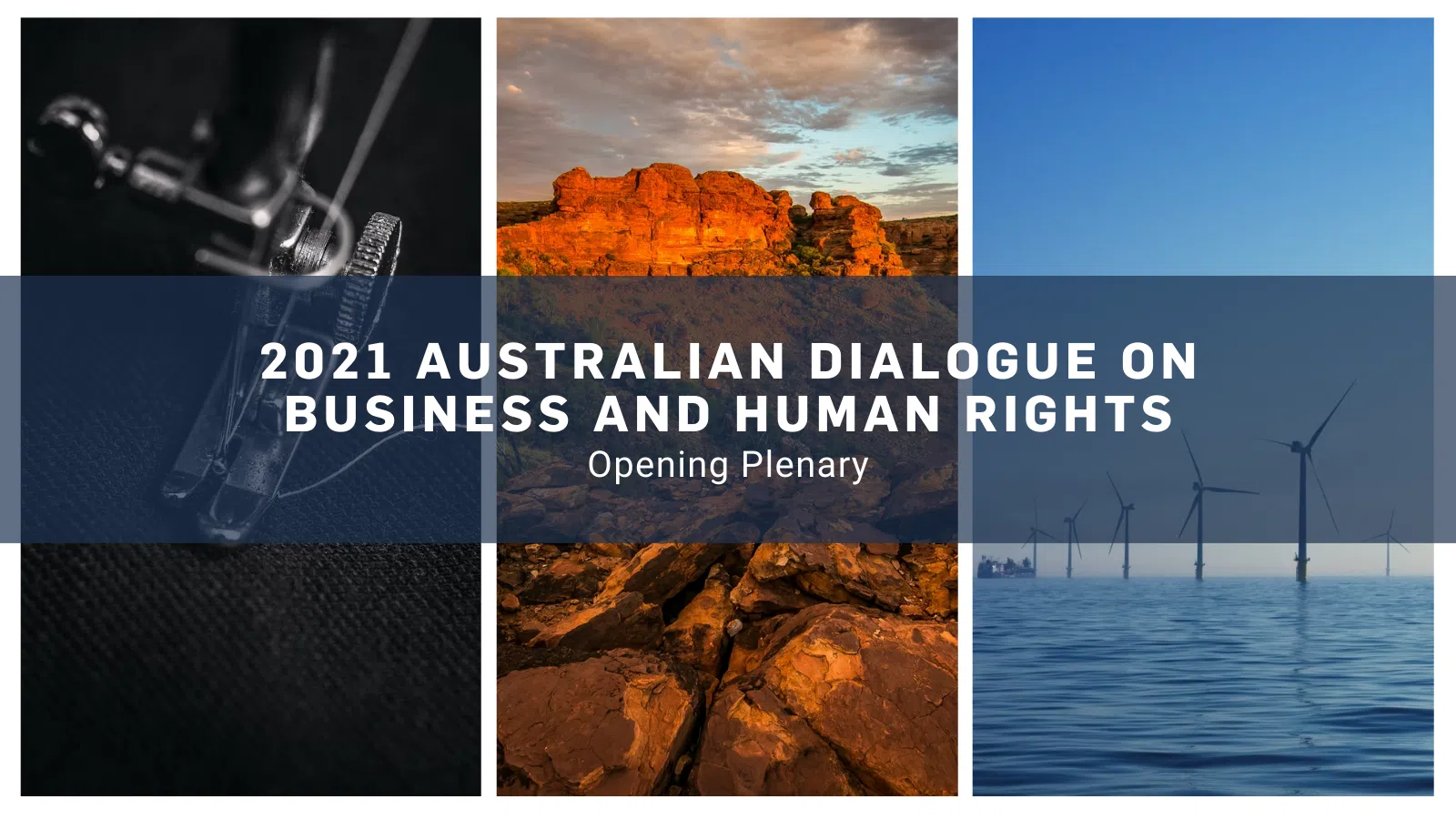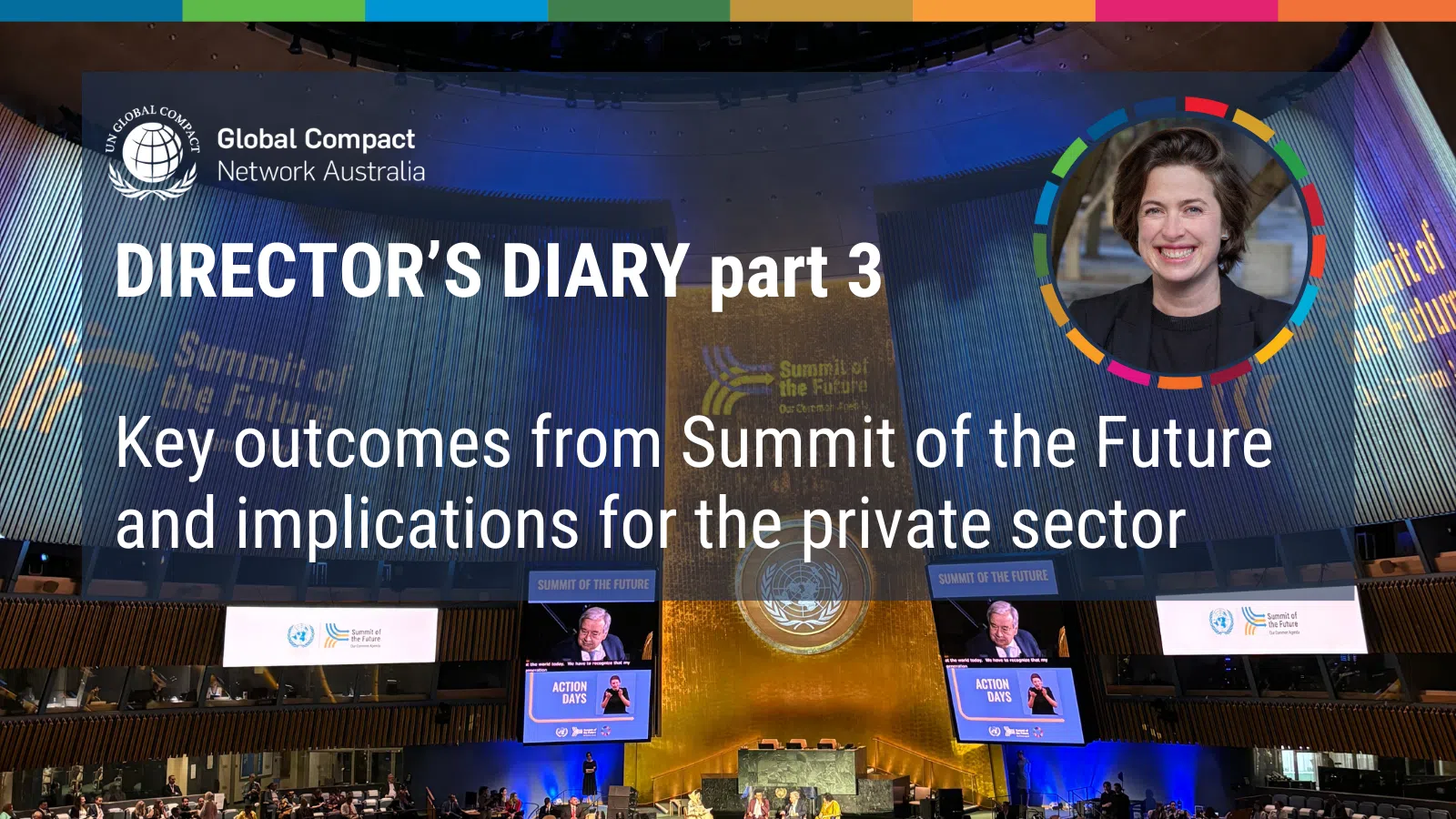
Blogs, Featured, Media, News, Sustainability Governance
BLOG | Key Takeaways from the 2022 Australian Dialogue on Bribery and Corruption
Dan Wilcock | December 13, 2022
On 8 November 2022, the UN Global Compact Network Australia, in collaboration with Allens, welcomed over 80 people to Australia’s annual national multi-sector, multi-stakeholder forum dedicated to advancing the Australian anti-bribery and corruption (ABC) agenda.
The Dialogue consisted of a keynote address, four panel discussions and a practical exercise led by Allens lawyers. Here are our key takeaways.
Keynote Address: The Australian Reform Agenda – Pierre Skorich, Director, National Anti-Corruption Commission Taskforce, Attorney-General’s Department
- 1. Global megatrends will challenge the global risk framework
- Mr Skorich referred to the megatrends identified by the CSIRO as providing a broad-based view of the challenges and opportunities facing Governments and business globally, such as adaptation to climate change, changing geopolitical landscape and a stronger consumer and citizen push for decision makers to consider trust, transparency, fairness and environmental and social governance.
- He observed that it is through our institutions that we manage the risks and capitalize on these opportunities, institutions that over the course of the past several years have demonstrated both their robustness and their fragility. Corruption is an insidious threat to our institutions which threatens global action on all megatrends, diverting resources from where they’re needed, undermining policy interventions and weakening collaboration. Maintaining cooperation is critical to protect the integrity of institutions and ongoing dialogue between government, private sector and civil society is important.
- 2. Federal Government’s International Priorities
- The Australian Government is actively focused on the effective implementation of relevant multilateral instruments, such as the UN Convention Against Corruption and the OECD Convention on Combating Bribery of Foreign Public Officials.
- In 2022, Australia Co-Chaired the G20 Anti-Corruption Working Group alongside the G20 President, Indonesia. Australia has also joined negotiations for the Indo-Pacific Economic Framework, which includes a pillar of work focused on tax and anti-corruption.
- 3. Federal Government’s Domestic Priorities
- Domestic priorities include the establishment of a National Anti-Corruption Commission (NACC) as a central pillar of Australia’s integrity framework. The NACC will have a broad jurisdiction to investigate serious or systemic corruption related to the Commonwealth, as well as providing education for an environment of integrity.
- Efforts to increase transparency in political donations, collaboration through the Open Government Partnership, and registering beneficial ownership are other focus areas.
Panel discussion: Operating at Home: The Domestic Anti-Corruption Environment
- 1. Insights from the business perspective
- Directors can find bribery and corruption investigations and prosecutions very confronting because, while they have experience dealing with civil matters, they are not typically experienced in criminal law and process.
- Businesses like certainty of outcome, certainty of timetable, predictability, and they like to minimise risk. Australia is a long way from providing certainty and predictability in the self-reporting process, with a perceived need for stronger education of AFP and Commonwealth Director of Public Prosecution (CDPP) staff, as well as clearer guidance from them on how self-reporting is dealt with in practice.
- There are complex considerations for a business running an independent investigation and considering self-reporting, as well as a diverse range of stakeholders to navigate. The introduction of Deferred Prosecution Agreements (DPAs) would assist with the effective functioning of the anti-bribery framework in Australia.
- 2. Insights from the investigation perspective
- There are a range of resources available to guide self-reporting and investigations, including a dedicated AFP webpage for self-reporting and detailed Best Practice Guidelines on corporate self-reporting. Consideration is still ongoing for applying the Guidelines with related stakeholders, such as the proceeds of crime authority and independent investigators.
- The AFP has established a corporate crime and foreign bribery team, and personnel are participating in skills development under the International Foreign Bribery Taskforce.
- Non-trial resolutions are receiving more consideration internationally and the AFP is on the public record supporting DPAs. Law reform options under consideration also include the addition of investigative tools such as ‘notice to produce’ powers to help uncover covert conduct.
- 3. Insights from the prosecution perspective
- The CDPP is guided on self-reporting by the Prosecution Policy of the Commonwealth.
- The CDPP operates in a legislative landscape with guidance from the Prosecution Policy and Best Practice Guidelines, which provide all the timelines and certainty they can give.
- It is significant to the CDPP if a company fully cooperates with an investigation and prosecution.
Panel discussion: Operating Abroad: Bribery and Corruption Risks in a Shifting Geopolitical Environment
- 1. The pandemic has affected corruption risks for global companies
- The pandemic has resulted in a partial fragmentation of corporate culture and localisation of operations.
- Initially, there was a focus on maintaining offshore operations, with less scope for corporate oversight and controls. Even with less travel, communications and training systems remained robust.
- This shift in corporate culture is still in a dynamic phase.
- 2. Economic crises, conflict and other international events have affected corruption risks.
- The Russian invasion of Ukraine increased the complexity of the compliance and regulatory environment. Companies rushed to identify Russian connections in their supply chains, assess their reputational risks and determine how to remain in compliance with rapidly growing sanctions regimes.
- Sri Lanka’s ongoing economic crisis demonstrates how corruption within one family can create a nationwide crisis. Long-term risks of instability, operational interruptions and reputational damage remain for companies operating in Sri Lanka, because the underlying corrupt infrastructure was not dismantled.
- There has also been a politicisation of corruption investigations in some jurisdictions to be aware of – targeting both domestic political players and foreign businesses.
- 3. The clean energy transition has potential anti-bribery and corruption implications
- The energy transition places additional pressures on companies, for example to rapidly source infrastructure such as solar panels to meet renewable energy targets. However, companies must ensure that they still follow their due diligence strategies, which includes incorporating bribery, corruption, environmental and human rights risk assessments.
- Companies should continue to recognise that some jurisdictions are higher risk than others when considering whether to source commodities or products from new jurisdictions.
Panel discussion: The Onward March of the Environment, Social & Governance (ESG) Movement
- 1. There are clear intersections between anti-corruption and the ESG movement
- Responsible investors are seeking to prevent issues such as exploitation and environmental harm, which are often also linked to ABC issues.
- A key link between ABC and ESG comes with recognition of managing broader reputational risk as a priority – poor management of issues can lead to a loss of trust, reputational damage, loss of social licence and reduced access to markets.
- 2. Cross-pollination between ABC and ESG
- ABC relies on extensive hard law, while ESG is more about influence – ESG tends to lift ABC above pure legal compliance and into compliance and ethics.
- Controls are a key area of cross-pollination, with ABC offering lessons to ESG.
- ESG covers a lot of performance and reporting requirements around topics like climate change and ESG is increasingly focused on governance
- 3. Breaking down compliance silos
- Businesses cannot manage in silos anymore, a wholistic view is needed.
- Disclosure between an organisation’s sustainability team and its risk team must be supported and driven to the front line by clear policies and procedures.
- ESG is becoming compliance and is being built into regulatory frameworks.
- 4. Increasing stakeholder expectations, reputational consequences and regulation
- Regulators are increasingly assessing the character and ethical culture of a company in an investigation context.
- Investors, banks and customers are increasingly looking at ABC and ESG issues in supplier relationships.
- Investors are looking at board accountability, policies and document processes. Overall trustworthiness is a key focus.
- Regulation is catching up, but there is a gap between stakeholder expectations and regulation.
- It is essential to operate beyond compliance and meet stakeholder expectations.
Panel discussion: Assessing Risk in an Evolving Environment
- 1. Effective general approach to conducting an ABC risk assessment – key steps include:
- identifying the subject of risk
- establishing a compliance baseline and values baseline
- identifying & quantifying risk
- assessing how controls target risk and the likelihood of effectiveness and residual risk.
- 2. Information to be gathered for effective risk assessment
- It is important to set a cultural framework within an organisation to ask the right questions and collect the correct data. An understanding of culture and systems operating within an organisation is required.
- Increased ties to broader ESG and corporate ethics concerns, requires risk to be assessed with a wider lens.
- 3. Risk assessment by large organisations
- A ‘group risk architecture’ is required to allow for a consistent approach across larger organisations. This should allow the organisation to calibrate risks and impacts, implement controls (both locally and globally) and give visibility of risk to the board and management.
- The interface between risk assessment and third-party due diligence allows businesses to assess the risks of engaging with a certain counterparty.
- 4. Getting the most out of risk assessment
- It is important to take a proactive approach to risk assessment, allowing a more positive and engaging experience for participants, where it is not perceived as a challenge or as a response to a deficiency.
- Risk assessment should also be an ongoing, dynamic exercise – risk and corruption develop and evolve.
- Risk assessment should also be repetitive and done routinely enough to enable proper decision making and embed risk awareness in the corporate culture.


